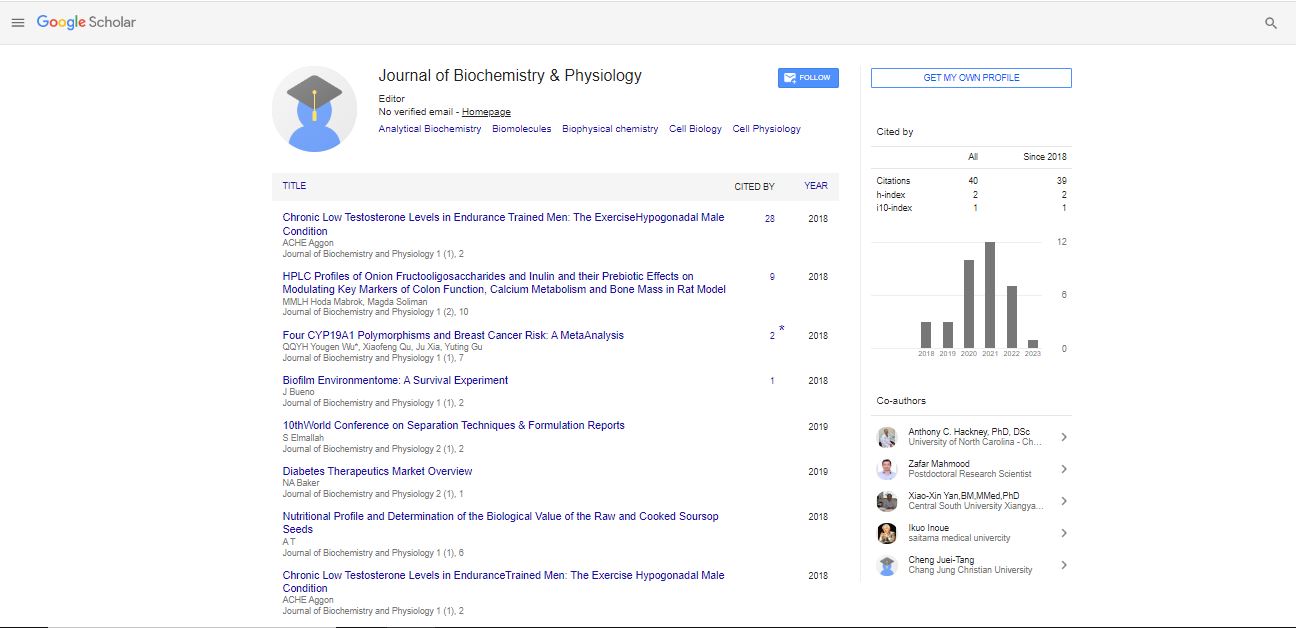Perspective, J Biochem Physiol Vol: 6 Issue: 3
Environmental Forces as Conductors of the Epigenetic Symphony of Gene Expression
Hamid Mirmohammad*
1Department of Genetic Engineering, National research Center, Dokki-Gizah, 12311, Egypt
*Corresponding Author: Hamid Mirmohammad,
Department of Genetic
Engineering, National research Center, Dokki-Gizah, 12311, Egypt
E-mail: Mirmohammadi2@gmail.com
Received date: 22 August, 2023, Manuscript No. JBPY-23-117704;
Editor assigned date: 24 August, 2023, Pre QC No. JBPY-23-117704 (PQ);
Reviewed date: 13 September, 2023, QC No. JBPY-23-117704;
Revised date: 21 September, 2023, Manuscript No: JBPY-23-117704 (R);
Published date: 28 September, 2023, DOI: 10. 4172/jbpy.1000142
Citation: Mirmohammadi H (2023) Environmental Forces as Conductors of the Epigenetic Symphony of Gene Expression. J Biochem Physiol 6:3.
Description
The field of epigenetics has shed new light on how our genes are orchestrated by environmental forces, creating a complex symphony of gene expression. While genes provide the basic blueprint for our biological makeup, epigenetic modifications and environmental cues act as the conductors, shaping when and how these genes are activated or silenced. we delve into the intricate dance between environmental forces and epigenetic regulation, uncovering the profound impact on our health, development, and even future generations.
Before we delve into the role of environmental forces, it's crucial to understand the basics of epigenetics. Epigenetics refers to the heritable changes in gene expression that occur without alterations in the DNA sequence itself. These changes, often mediated by chemical modifications to DNA or associated proteins, serve as the fine-tuning of gene regulation. Epigenetic modifications are the conductors of the genetic orchestra, determining which genes play, pause, or remain silent. These modifications include DNA methylation, histone acetylation, and microRNA expression, among others. Environmental factors can influence these epigenetic marks, thus orchestrating a symphony of gene expression that can have profound effects on an individual's health and development.
One of the key conductors in the epigenetic symphony is the environment. The environment encompasses a wide range of factors, from nutrition and chemical exposures to stress and social interactions. Each of these elements can leave a unique epigenetic signature on our genes. Nutrition plays a significant role in epigenetic regulation. For instance, studies have shown that maternal diet during pregnancy can influence the epigenetic marks on genes associated with the development of chronic diseases in offspring. Inadequate maternal nutrition can lead to epigenetic changes in genes related to metabolism, potentially increasing the risk of obesity and diabetes in later life.
Furthermore, the epigenetic effects of diet are not limited to early development. Our dietary choices throughout life can impact gene expression. The consumption of certain nutrients, such as folate, can alter DNA methylation patterns, potentially influencing the risk of cancer and other diseases. Environmental toxins, from heavy metals to industrial chemicals, also wield a conductor's baton in the epigenetic symphony. Exposure to these substances can lead to epigenetic alterations, increasing the risk of various health issues. For example, exposure to Polycyclic Aromatic Hydrocarbons (PAHs), commonly found in air pollution and cigarette smoke, can lead to DNA methylation changes associated with lung cancer. The pesticide DDT has also been linked to epigenetic modifications that may contribute to conditions like obesity and breast cancer. These examples illustrate how environmental toxins can disrupt the epigenetic harmony, leading to discordant gene expression and health consequences.
Stress is yet another influential conductor in the epigenetic symphony. When we experience stress, our bodies release stress hormones, which can, in turn, impact gene expression. Chronic stress can lead to persistent changes in epigenetic marks, affecting genes associated with mental health and the body's stress response. For example, studies have revealed that childhood trauma can lead to epigenetic changes in genes linked to depression and Post-Traumatic Stress Disorder (PTSD). These changes might explain why individuals exposed to trauma are more susceptible to these conditions later in life.
The environment isn't just physical; it also encompasses our social interactions. Human relationships and social experiences can exert a powerful influence on gene expression. For instance, nurturing and supportive environments can lead to positive epigenetic changes in genes that promote mental well-being. On the flip side, adverse social experiences, such as neglect and abuse, can result in negative epigenetic changes in genes associated with mental health and stress regulation. The epigenetic effects of social interactions underscore the importance of a supportive and caring social environment for overall well-being.
The epigenetic symphony doesn't just impact individuals; it can have a lasting effect on future generations. Emerging research suggests that some epigenetic modifications can be passed from one generation to the next, a phenomenon known as epigenetic inheritance. For example, a study on Dutch famine survivors found that the descendants of individuals who experienced severe famine during World War II had altered DNA methylation patterns associated with various metabolic and cardiovascular conditions. This transgenerational epigenetic inheritance highlights the enduring consequences of environmental forces on gene expression.
Environmental forces play a pivotal role as conductors of the epigenetic symphony of gene expression. Nutrition, environmental toxins, stress, and social interactions all influence the epigenetic marks on our genes, shaping our health, development, and even the health of future generations. Understanding this intricate interplay between our genes and the environment offers valuable insights for disease prevention and the promotion of overall well-being. The epigenetic symphony reminds us that our genes are not static, but rather responsive to the ever-changing environment in which we live.
 Spanish
Spanish  Chinese
Chinese  Russian
Russian  German
German  French
French  Japanese
Japanese  Portuguese
Portuguese  Hindi
Hindi 